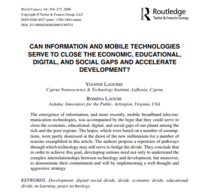Can Information and mobile technologies serve close the economic, educational, digital and social gaps and accelerate development?: Difference between revisions
No edit summary |
(changed year) |
||
| (3 intermediate revisions by the same user not shown) | |||
| Line 1: | Line 1: | ||
{{Journal Publication | {{Journal Publication | ||
|acronym=Can Information and mobile technologies serve close the economic, educational, digital and social gaps and accelerate development? | |acronym=Can Information and mobile technologies serve close the economic, educational, digital and social gaps and accelerate development? | ||
|logo= | |logo=World Futures2008.png | ||
|authors=[[Yiannis Laouris]] & [[Romina Laouri]] | |authors=[[Yiannis Laouris]] & [[Romina Laouri]] | ||
|journal=World Futures: Journal of General Evolution | |journal=World Futures: Journal of General Evolution | ||
|volume=64: 4 | |volume=64: 4 | ||
|pages=254 - 275 | |pages=254 - 275 | ||
|year= | |year=2008 | ||
|link=https:// | |link=https://doi.org/10.1080/02604020802189534 | ||
}} | }} | ||
==Abstract== | ==Abstract== | ||
The emergence of information, and more recently, mobile broadband telecommunication technologies, was accompanied by the hype that they could serve to close the economic, educational, digital, and social gaps of our planet among the rich and the poor regions. The hopes, which were based on a number of assumptions, were partly dismissed at the dawn of the new millennium for a number of reasons exemplified in this article. The authors propose a repertoire of pathways through which technology may still serve to bridge the divide. They conclude that in order to achieve this goal, developing nations need not only to understand the complex interrelationships between technology and development, but moreover, to demonstrate their commitment and will by implementing a well-thought and aggressive strategy. | The emergence of information, and more recently, mobile broadband telecommunication technologies, was accompanied by the hype that they could serve to close the economic, educational, digital, and social gaps of our planet among the rich and the poor regions. The hopes, which were based on a number of assumptions, were partly dismissed at the dawn of the new millennium for a number of reasons exemplified in this article. The authors propose a repertoire of pathways through which technology may still serve to bridge the divide. They conclude that in order to achieve this goal, developing nations need not only to understand the complex interrelationships between technology and development, but moreover, to demonstrate their commitment and will by implementing a well-thought and aggressive strategy. | ||
==Citation== | |||
Laouris, Y., & Laouri, R. (2008). Can information and mobile technologies serve to close the economic, educational, digital, and social gaps and accelerate development?. World Futures, 64(4), 254-275. | |||
[[Media:WorldFutures_mLearngToCloseGapLaouris_Laouri.pdf|Download Paper]] | [[Media:WorldFutures_mLearngToCloseGapLaouris_Laouri.pdf|Download Paper]] | ||
Latest revision as of 23:04, 23 November 2023
|
Abstract
The emergence of information, and more recently, mobile broadband telecommunication technologies, was accompanied by the hype that they could serve to close the economic, educational, digital, and social gaps of our planet among the rich and the poor regions. The hopes, which were based on a number of assumptions, were partly dismissed at the dawn of the new millennium for a number of reasons exemplified in this article. The authors propose a repertoire of pathways through which technology may still serve to bridge the divide. They conclude that in order to achieve this goal, developing nations need not only to understand the complex interrelationships between technology and development, but moreover, to demonstrate their commitment and will by implementing a well-thought and aggressive strategy.
Citation
Laouris, Y., & Laouri, R. (2008). Can information and mobile technologies serve to close the economic, educational, digital, and social gaps and accelerate development?. World Futures, 64(4), 254-275.
